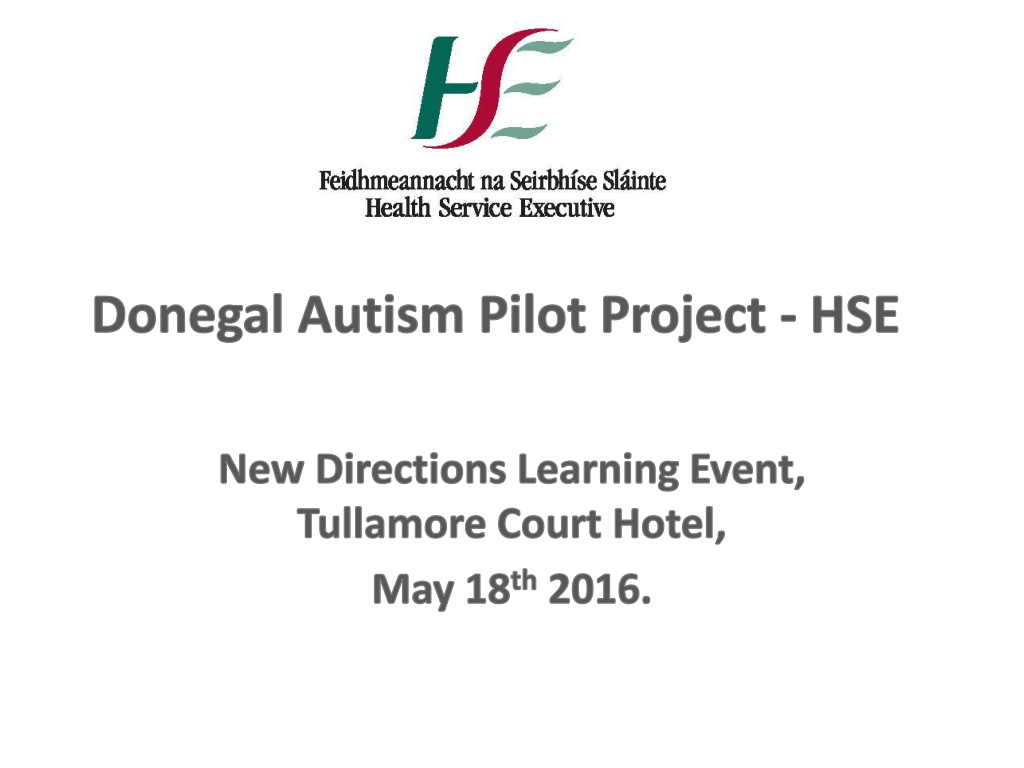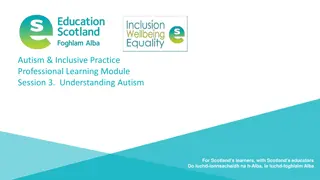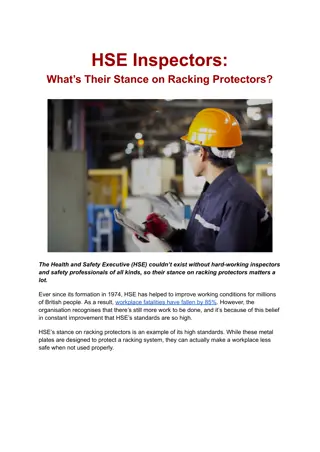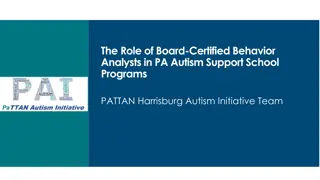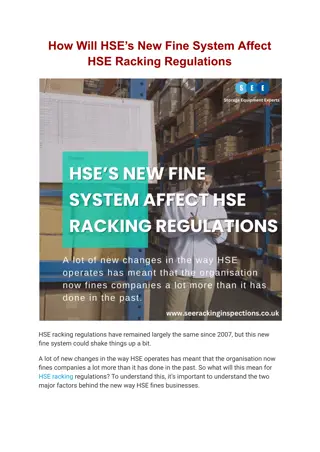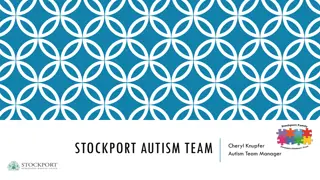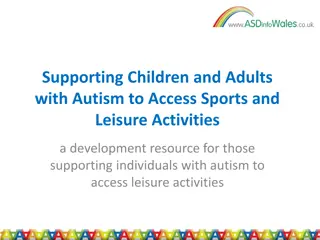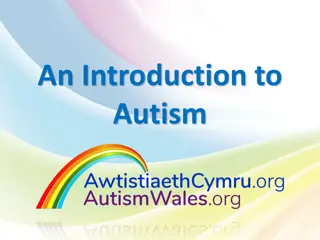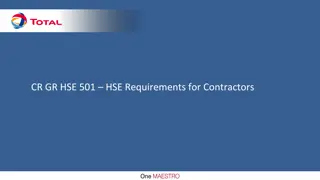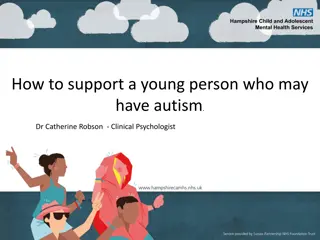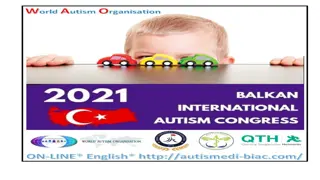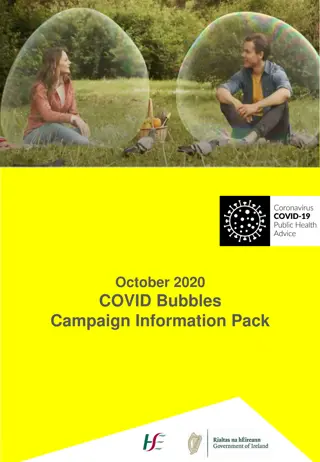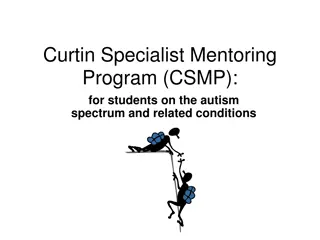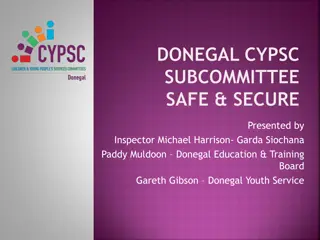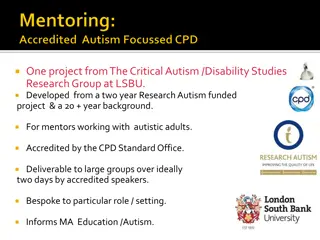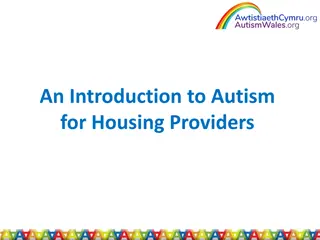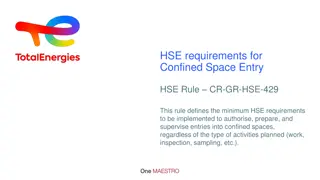Donegal Autism Pilot Project - HSE
Through the efforts of the Donegal Autism Pilot Project, significant strides have been made in reconfiguring services to better support individuals with Autism and intellectual disabilities. Challenges such as staff awareness, absenteeism, and communication have been addressed, leading to a more Autism-friendly environment. The project implemented practical steps like bespoke training, personalized support plans, and regular review meetings to overcome obstacles and create a more inclusive and supportive atmosphere for service users, families, and staff.
Download Presentation

Please find below an Image/Link to download the presentation.
The content on the website is provided AS IS for your information and personal use only. It may not be sold, licensed, or shared on other websites without obtaining consent from the author.If you encounter any issues during the download, it is possible that the publisher has removed the file from their server.
You are allowed to download the files provided on this website for personal or commercial use, subject to the condition that they are used lawfully. All files are the property of their respective owners.
The content on the website is provided AS IS for your information and personal use only. It may not be sold, licensed, or shared on other websites without obtaining consent from the author.
E N D
Presentation Transcript
Donegal Autism Pilot Project - HSE New Directions Learning Event, Tullamore Court Hotel, May 18th2016.
Tobar Training Centre Click below to view the Tobar Training Centre location
Outline of the Change / Reconfiguration More complex referrals Service Users with ID & Autism with behaviours that challenges Challenges for both staff and service users Tobar Increased to 36 service users No new staff
Practical Steps Taken Steering Group MDT Three distinct phases APP Training Services Service within an existing service Family Involvement Autism Project Psychology Psychiatry Social Work Occupational Guidance ID Services Ongoing training, supervision and support from APP 1 day per week Bespoke Staff Training Rotation of staff
Practical Steps Taken A Phased Approach Assessment, ASD awareness/simulation activities Bespoke Training, Read the person- PBS plan, Sensory Training, ASD Environment, 1 Skills / Capacity Building, Centre Reintegration All Staff working with trainees 2 Community Integration 3
Challenges Involved Service Users Families Staff No suitable service for their sons/daughters with behaviours that challenge No new staff/ more complex service users Limited staff awareness of their individual needs High rate of absenteeism /sick leave Autism UNFRIENDLY Environment Limited engagement with services High stress levels and burnout High Levels of Anxiety Poor communication Assault Negative previous experiences Limited Understanding of Autism Low engagement/Isolation
Challenges Overcome Service Users Families Staff Autism Friendly Environment Intensive bespoke staff training Tailored Formal daily communication system Individualised skill building plans Third party expertise 1 day a week Bespoke staff training regarding service users unique needs 3/ 6 monthly Review meetings Rotation of staff Individualized Positive Behavior Support plans (PBS) Specific protocols and procedures Monthly informal meetings with Social work Understanding of Autism- simulation activities Peer Buddy System
Overcoming the Challenges View the ASD Friendly Environment and Skills-Building
Overcoming Staff Challenges -All staff received bespoke training, shadowing/mentoring provided from ASD staff group -High staff stress levels when working with ASD service users with behaviors that challenge -Small group of ASD staff identified who received intensive bespoke training- -ALL staff now working with service users -Frequent staff absenteeism -ASD coordinator established -Staff report increase job satisfaction -Staff burnout
Overcoming the Challenges Project- Collaborating with the Men s Shed View the Sound Board Insulation
What do the changes mean for the Service User(s) Decrease in behaviours that challenge 10 9 8 7 6 Pre Intervention 5 Post Intervention 4 3 2 1 0 Jan Feb Mar Apr May June July Aug Sep Oct Nov Dec
What do the changes mean for the Service User(s) A brief case study- Service User A Before After High levels of inappropriate touching and masturbation Fatigue sleeping within the centre Staff avoidance of this service user Peer avoidance Significant rituals Limited engagement in group activities Antagonistic behaviour No masturbation, appropriate interactions Increased energy levels (no sleeping) All staff working with this service user Positive peer relationships, peer buddies Reduction in rituals Engagement in all group activities Reduction in antagonistic behaviour, increase in mischievous / playful interactions
What do the changes mean for the Service User(s) Individualised Behaviour Support Strategies View individualised behaviour supports documents
What do the changes mean for the Service User(s) Feedback from Service Users Families- Taken directly from monitoring report by Occupational Guidance Service *Names have been changed Excellent communication between staff and the family John is more relaxed, calm at home since the project started The environmental changes, the effort and approach taken in the programme is benefitting C Brendan is more relaxed staff are beginning to tap into his potential
What do the changes mean for the Service Staff Structures Highly Trained Staff Flexible Staff Rotas Formal Communication system between day and respite / residential services Formal Communication system with families Internal Service Policy, protocols and procedures in responding to behaviors that challenge Autism friendly surroundings Holistic behaviour support strategies and plans Strength focused
Implementing New Directions in the ASD Pilot Project in Tobar Training Centre Before After Formal Communication system between day and respite / residential services
